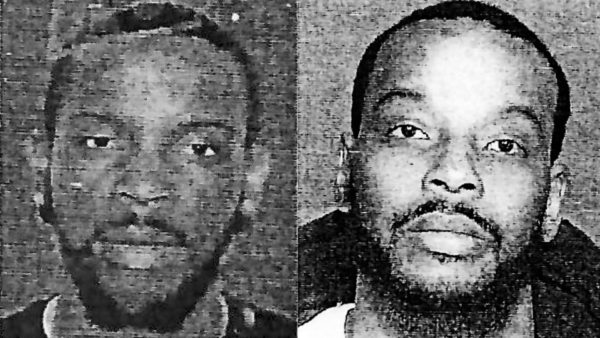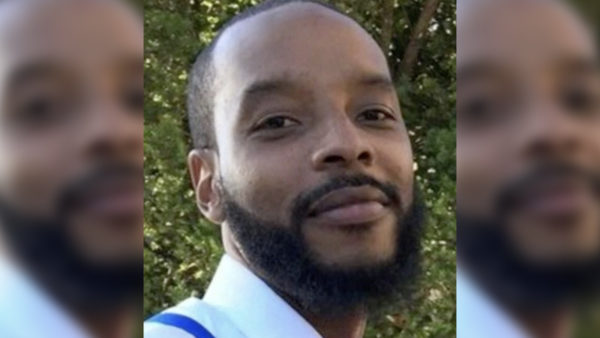A New Jersey man spent 10 months trying to clear his name after facial recognition software wrongfully identified him as the suspect in a violent 2019 getaway.
Nijeer Parks spent at least eight days in jail and was never given a chance to explain that he was not in Woodbridge, New Jersey, the day a man nearly ran an officer over while trying to escape police custody at a hotel.
Parks had, in fact, never heard of the city and didn’t even own a driver’s license, according to court documents. He had proof to show he was at a Western Union in his hometown of Paterson, New Jersey at the time of the encounter.
Even after being presented alibi evidence that seemed to exonerate Parks, prosecutors spent nearly a year trying to coax him into pleading guilty to a myriad of charges that could have landed him in prison for 20 years. Parks refused, knowing it was a case of mistaken identity and that he was an innocent man.
The charges were dropped on the eve of Parks’ trial in November 2019. Now he is suing the police officers and prosecutors involved in a federal lawsuit that alleges Parks was falsely imprisoned as a result of a “civil conspiracy” that violated his constitutional rights.
“Fortunately, Mr. Parks was not one of these cases where he was wrongfully convicted and sat in jail for years,” Daniel Sexton, Parks’ Jersey City attorney, told Atlanta Black Star during a phone interview. “But he spent eight days in confinement. The whole experience of being arrested for something that he had nothing to do with. The experience of spending a year being threatened with prosecution and being pushed into accepting a plea deal for something he had nothing to do with was pretty unsettling.”
Sexton originally filed the complaint Nov. 25 in Superior Court of New Jersey. The suit was against Woodbridge Mayor John McCormack, Woodbridge Police Chief Robert Hubner, Woodbridge police officers Andrew Lyszk, Sgt. Joseph Licciardi and 20 unidentified Woodbridge police officers, the Middlesex Department of Corrections and Assistant Middlesex County prosecutors Christopher Kuberiet and Peter Nastasi.
Idemia Inc., the French tech company that makes the facial recognition software that identified Parks, is also listed as a defendant in the case.
“We know that these facial recognition programs are faulty,” Sexton said. “And we know they’re especially faulty when dealing with African Americans face a variety of reasons.”

The case was transferred to U.S. District Court of New Jersey on March 3, where Parks will be arguing for punitive and compensatory monetary damages.
The incident happened Jan. 26, 2019 at a Hampton Inn in Woodbridge, New Jersey. A clerk at the hotel called officers to report that a man had stolen candy from the inn’s gift shop. The clerk described the suspect as 5 feet 10 or 5-11 in height, according to Woodbridge police reports that Sexton provided Atlanta Black Star. Parks is listed as 5 feet 7 in booking records.
The man was still in the hotel when patrol officer Andrew Lyszk arrived. Lyszk asked him about the candy and the man apologized, then paid for the stolen items. He gave the officer a Tennessee driver’s license. Lyszk noted that the suspect appeared nervous, pacing back and forth in the hotel lobby, when he stepped outside and called dispatch to check the license. It proved to be fake.
After learning about the fake ID, two officers went back into the lobby and found a bag containing 44 grams of marijuana in the suspect’s jacket pocket. The man took off running when officers tried to handcuff him, darting across the hotel lobby so quickly that he lost a shoe as he escaped out the back door.
He ran around the building and jumped into his rental car, which was parked in the front parking lot. The two officers stood on both sides of the Dodge Charger with their weapons drawn and ordered him to shut the car off as the man backed out. The suspect stopped momentarily then ignored the officers’ commands and sped out of the parking lot. One of the policemen had to jump out of the way to avoid being hit by the car. The man crashed into an officer’s squad car and a concrete column in the hotel’s carport as he made his escape. The man vanished without a trace.
Police found the stolen vehicle the following morning, abandoned in a parking lot behind an office building about a mile away. Officers impounded the car for evidence and wiped it down, lifting several fingerprints, according to investigators.
The suspect’s sneaker, his fake Tennessee license as well as a water bottle that police saw the man drink from while they were on scene were all recovered for evidence by investigators.
Witnesses, police and hotel staff all agreed that the picture on the fake driver’s license was an actual photo of the suspect. Woodbridge detectives sent that photo to the Regional Operations Intelligence Center as well as the New York State Intelligence Center to have it scanned for facial recognition. The following day, NYSIC notified the Woodbridge detectives there was a “high profile” comparison on the photo, identifying the culprit as Nijeer Parks.

The investigative reports indicate detectives compared the photo on the fake ID to a New Jersey driver’s license number assigned to Parks. They determined it was the same person and charged Parks. A supervisor approved the criminal complaint and a judge issued a warrant for Parks’ arrest Jan. 30, 2019.
Detectives then drove to Parks’ apartment in Paterson, New Jersey, where he lived with his grandmother, to arrest him but he wasn’t home. Parks’ grandmother called him to tell him that police showed up to the house trying to serve him an arrest warrant.
When Parks called the Woodridge Police Department to ask about the warrant, he told a municipal clerk he’d never been to or knew of Woodbridge and said he didn’t have a driver’s license. The clerk told him to “come down and clear the matter up,” the lawsuit stated.
Parks went to the Woodbridge police station Feb. 5 and tried to explain that it was a case of mistaken identity. Police immediately arrested and charged him with two counts of aggravated assault with a weapon, unlawful possession of a weapon, reckless driving, leaving the scene of an accident, shoplifting, hindering apprehension or prosecution, possession of marijuana, possession of drug paraphernalia, obstruction administration of the law, exhibiting false government documents, resisting arrest, eluding and criminal mischief.
“Four or five minutes later as me and [the clerk] were talking, two other officers walk up and tell me to put my hands behind my back,” Parks recounted during an interview with CNN Business. “He’s like, ‘Put your hands behind your back. You’re under arrest.'”
Officers badgered him with accusations, saying, “You were the one who tried to run over a police officer at the Hampton Inn.” At one point during the interrogation, investigators tried to move Parks to a back room that wasn’t eqiuipped with cameras.
Afraid that he’d be tortured into giving a false confession, Parks fell to the ground and faked an asthma attack, his lawsuit indicates. The cops called EMS, and Parks told one of the paramedics he was afraid he was going to get beaten up and asked her to take a photo of him to document his condition.
Police booked him into the Middlesex County Corrections Center afterward and Parks spent at least eight days in jail. He remained in solitary confinement for the first seven days under the threat of violence from corrections officers, who verbally abused him and alleged that “he had attacked a fellow officer,” his complaint says.
Parks appeared in court twice while he was in custody, and both times he explained why it was impossible for him to have committed the crimes. His lawsuit contends the prosecutors showed a “deliberate indifference” and a “reckless disregard” for the truth by not considering the exonerating evidence that pointed to Parks’ innocence.
In Parks’ lawsuit, the 33-year-old claims investigators never disclosed any forensic testing or fingerprint evidence. Sexton argued authorities relied solely on the facial recognition analysis to make their case despite the fact that it isn’t a reliable source.
According to the lawsuit, a National Institute of Standards and Technology study found that Black people are up to 100 times more likely that whites to be misidentified by facial recognition software. The civil complaint indicated it “shocks the conscience” that prosecutors and investigators failed to corroborate the facial recognition ID with witnesses, fingerprints or any other evidence.
Parks was convicted of several prior drug felonies and spent time in prison, his criminal history shows. Sexton argued that means his fingerprints were already on file in the state’s system and were easily accessible.
“Nijeer was a young man who had made some mistakes early on and was making an effort to turn his life around. And this is the type of thing that could really have upended that,” Sexton said. “Fortunately it has not. Nijeer is doing really well despite all of this.”
After prosecutors turned over documents that detailed the allegations against him, Parks presented receipts from Western Union that showed he was wiring money to his fiancée from a Paterson location 30 miles away while the incident at the Woodbridge Hampton Inn was occurring. Prosecutors still tried to pressure him into accepting a plea deal that exposed him to years in prison.
The lawsuit indicates Parks suffered physical pain and emotional distress because of his wrongful arrest and incarceration. He lost his job while in custody and had to plead with his boss to be reinstated.
The suit insists Parks was subjected to cruel and unusual punishment, excessive force and the ordeal was a violation of his civil rights. The complaint went on to allege the arrest interfered with his business reputation and the plaintiffs intentionally inflicted emotional distress upon him.
“You took being comfortable away from me,” Parks said to CNN. “I see police, I’m automatically shaken up. You proved to me that you can lock me up for anything, and there’s nothing I can do about it.”
Parks became the third case of someone falsely accused due to facial recognition technology, according to MSN News. The other two cases involved Black men as well. Robert Williams and Michael Oliver, both of Detroit, had their respective charges dropped after investigators realized their photos didn’t match those of the suspects in their cases.
Experts say facial recognition algorithms disproportionately misidentify darker skinned people. Civil rights advocates worry that more law enforcement agencies use the technology as an investigative tool, the issue of misidentification could become an ever-growing problem.
“He looks nothing like him … nothing like him,” Parks’ mother, Patricia, said of the suspect in the photo that landed her son behind bars. “People have a saying ‘all Black people look the same.’ That’s the first thing came to my mind when I’d seen this photo because it looks nothing like my son.”
Attorneys for the Woodbridge police officers and city officials filed an answer to the complaint March 29. Local attorney Fredrick Rubenstein, who is representing the Woodbridge defendants, did not return phone calls and emails from Atlanta Black Star requesting a copy of March 29 filing.
Sexton said Rubenstein relied heavily on qualified immunity in his argument, saying the doctrine safeguards Woodbridge police and city officials from legal action.
“I’m a big supporter of police, honestly. But there’s nothing worse than a bad cop,” Sexton said. “And there’s nothing worse than the culture in a police department where most of the officers are doing a good job that allows bad cops go on unchecked. So was it malicious or was it lazy? We’ll find out. It looks to me that there was a maliciousness. And then perhaps that unacceptable mindset, which says ‘Well if he’s not guilty of this, then he’s guilty of something else.’ And that’s not the way it’s supposed to work.”


